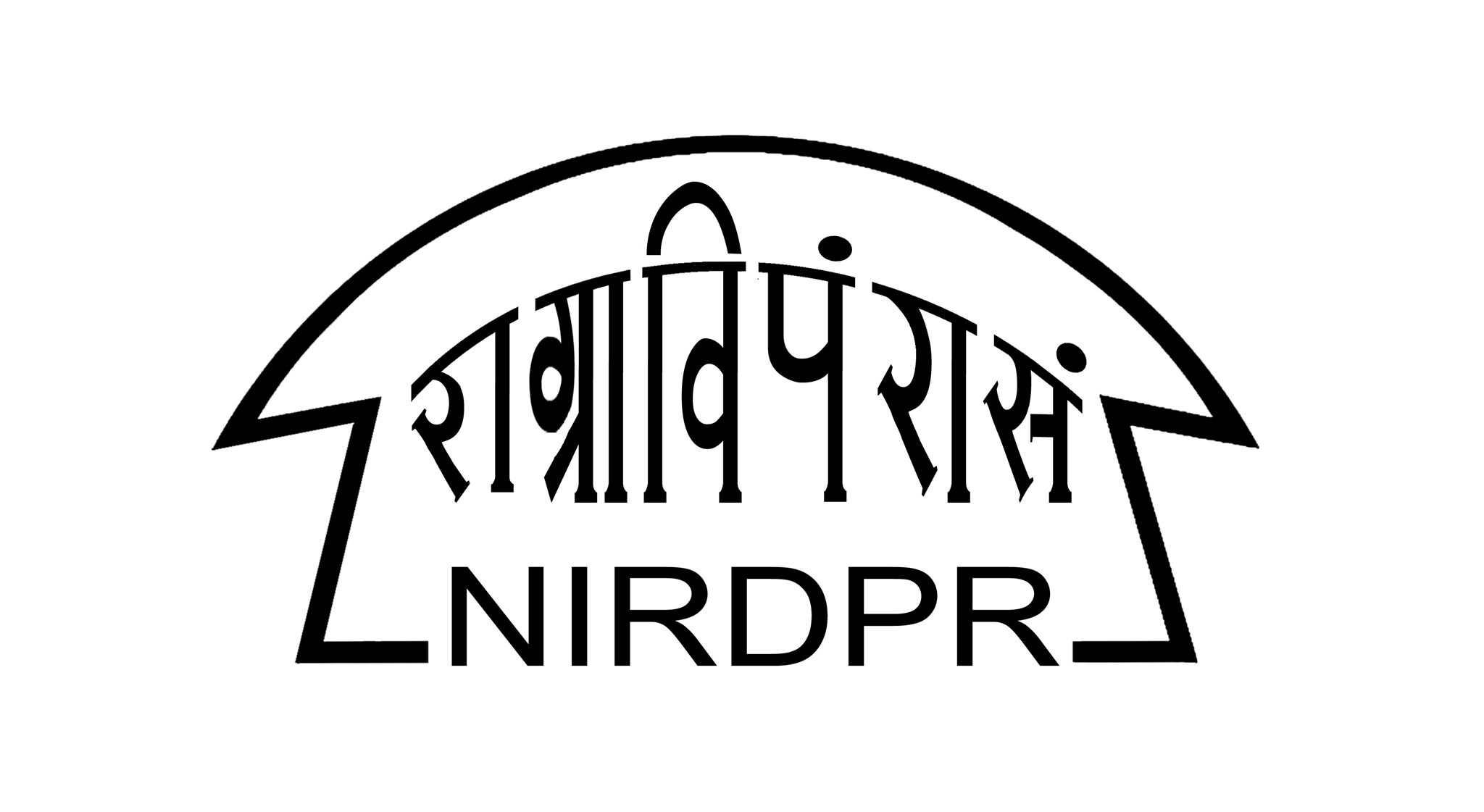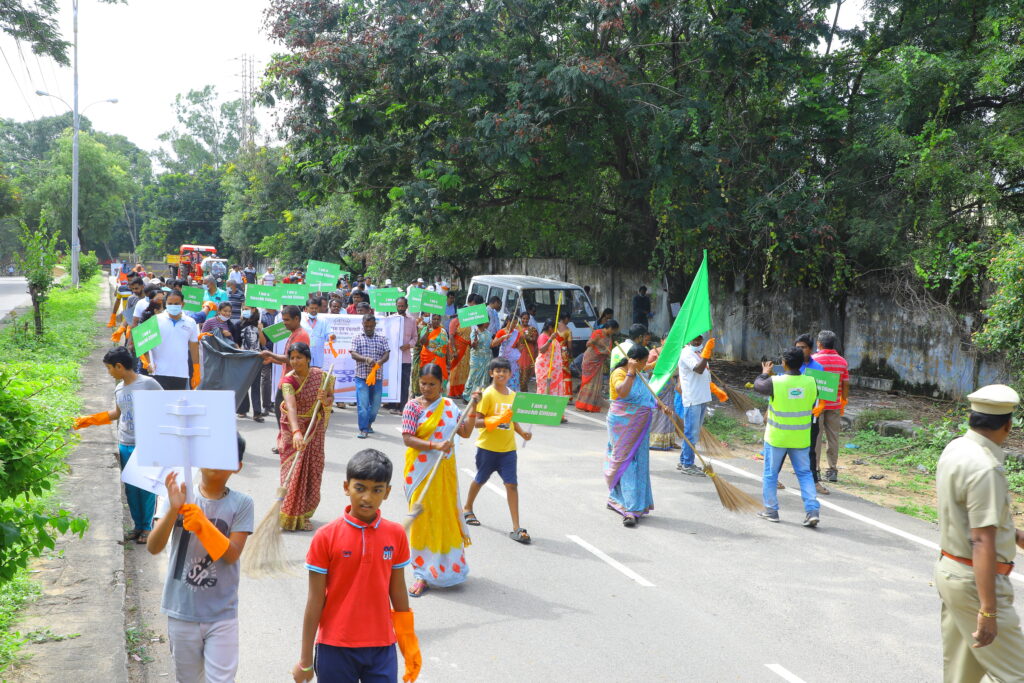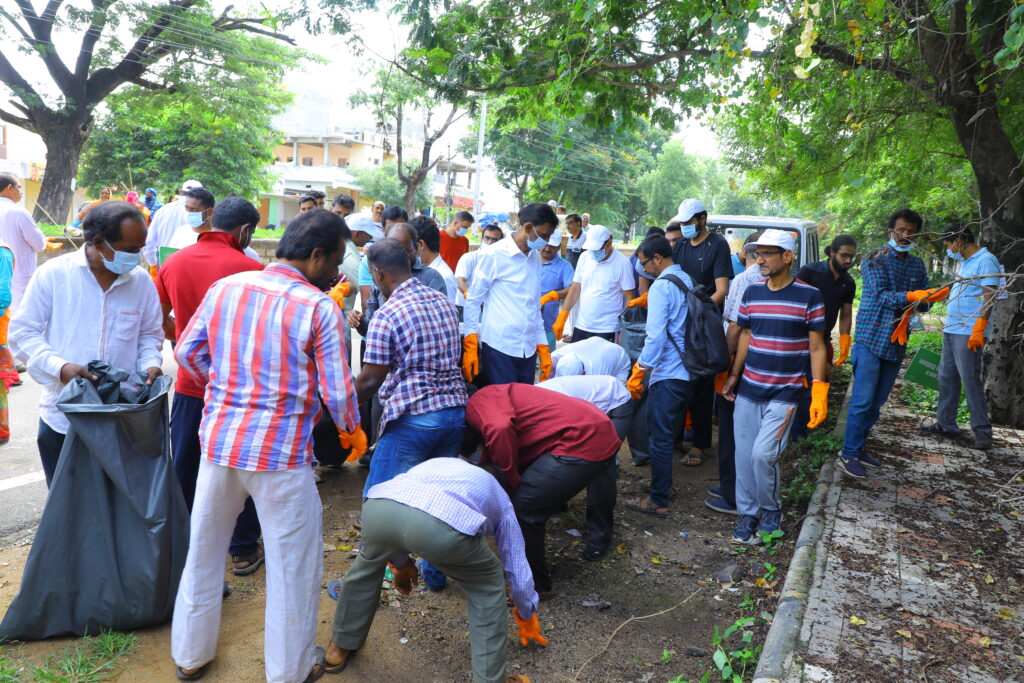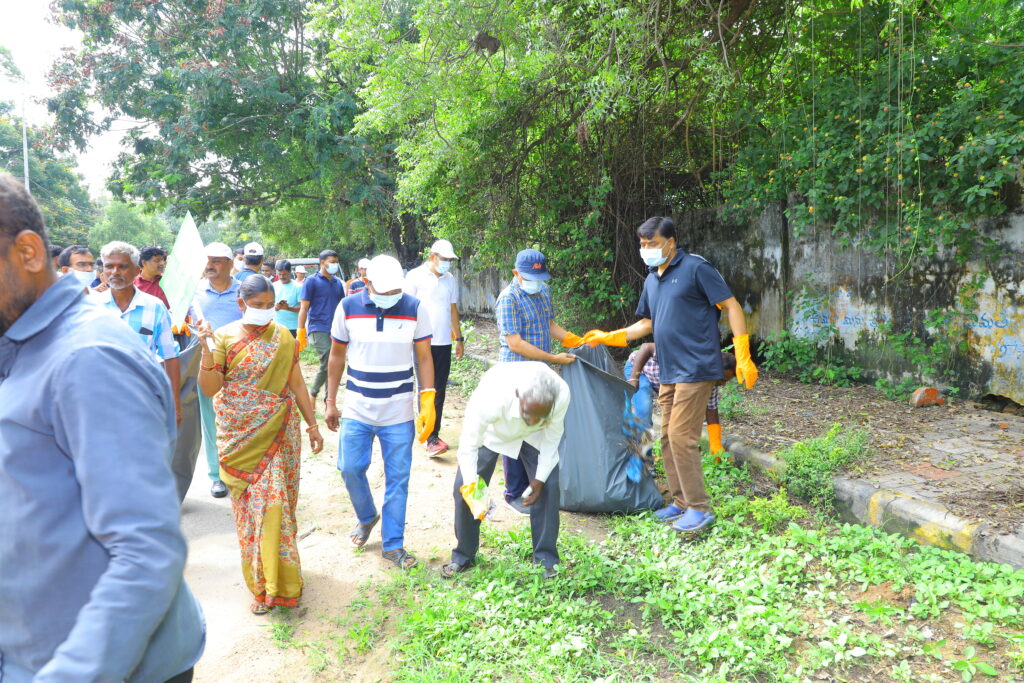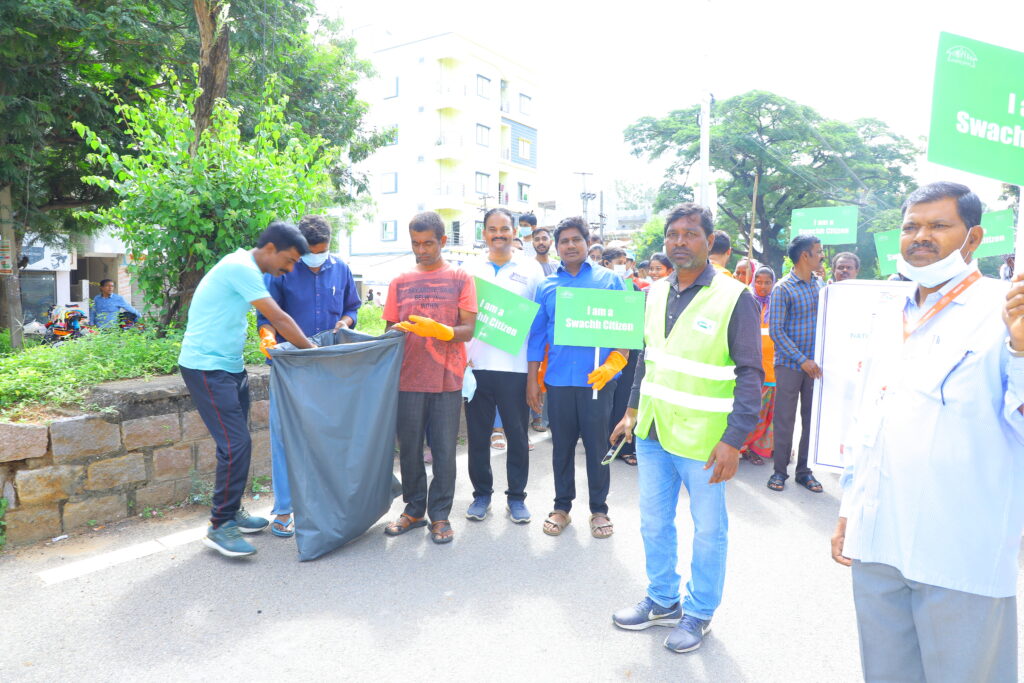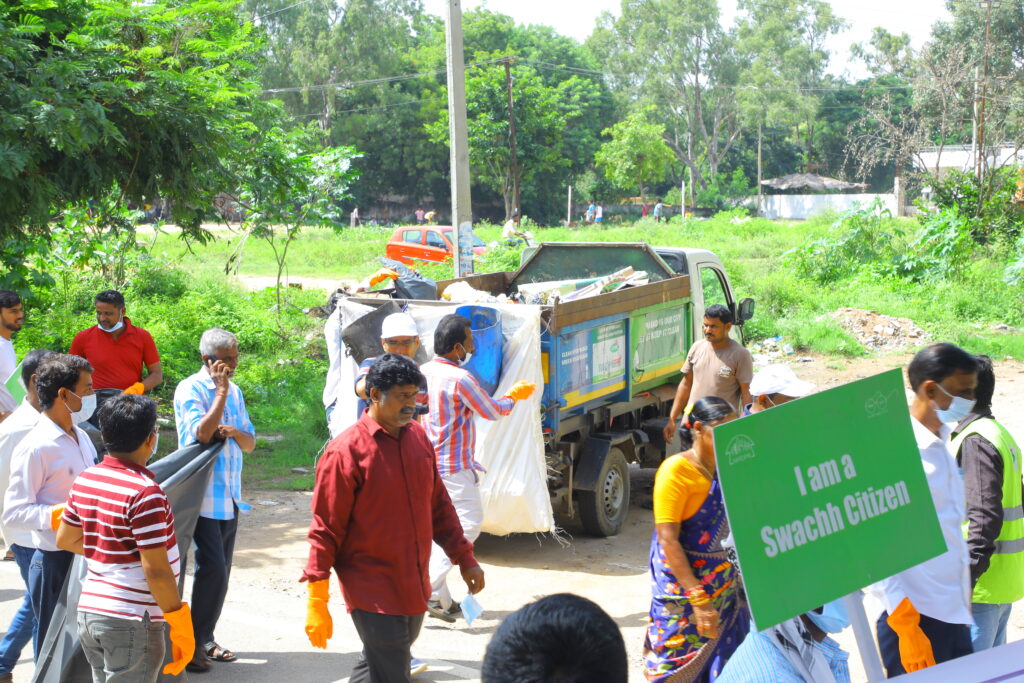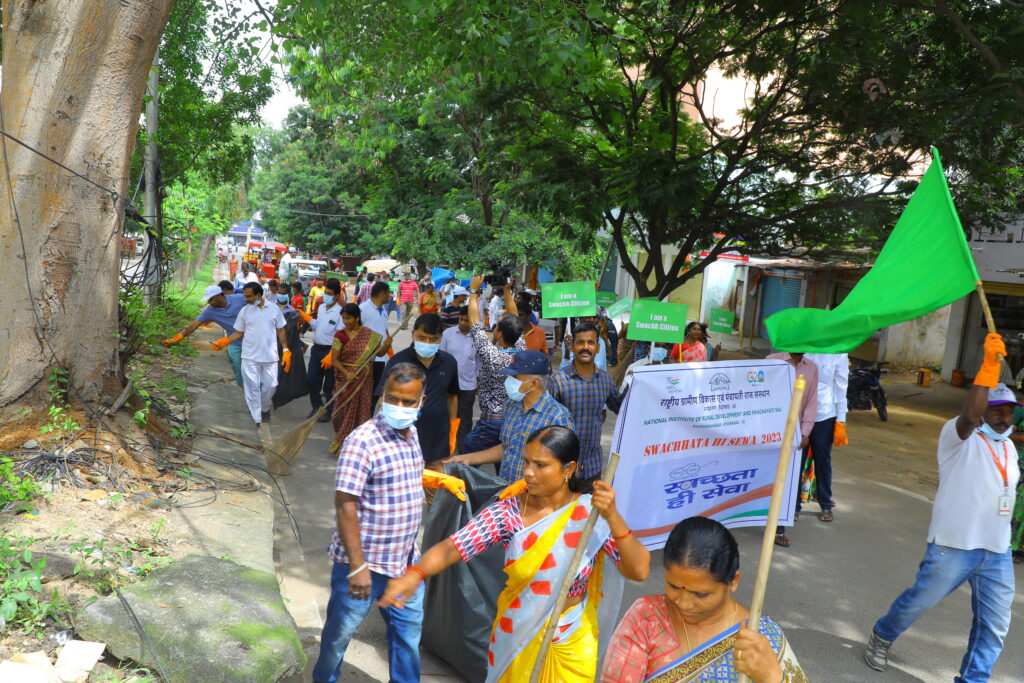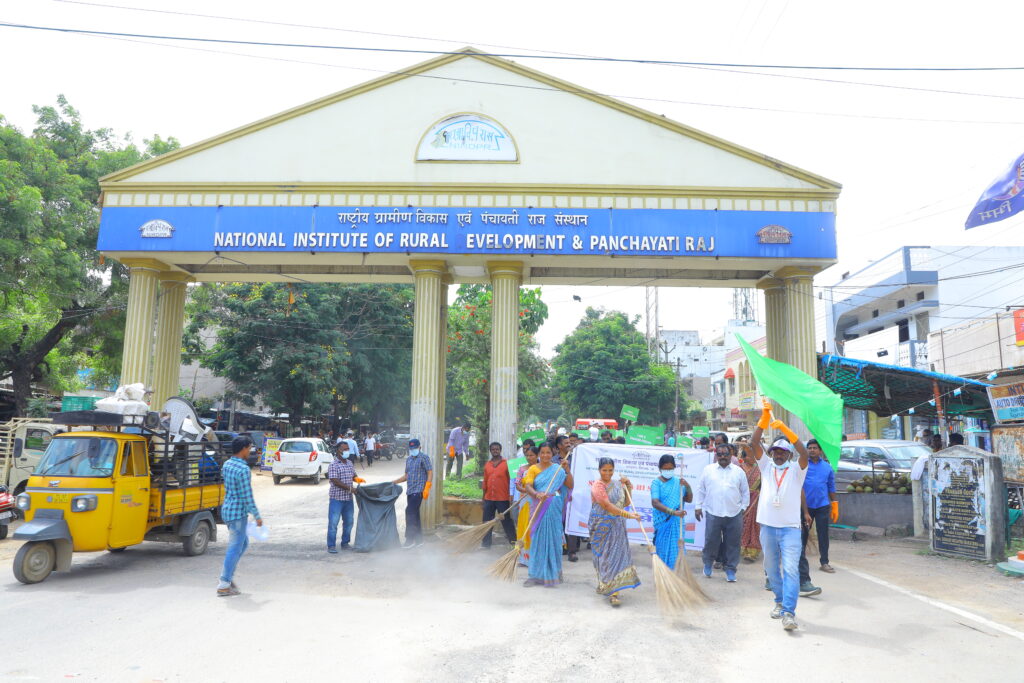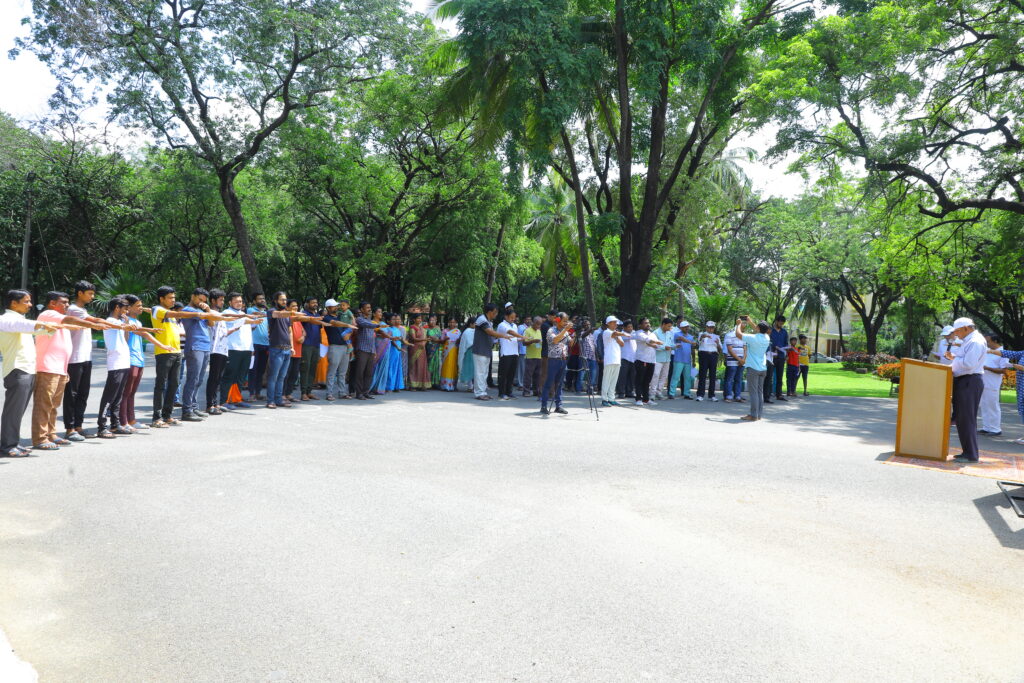
CONTENTS:
LEAD STORY:
@NIRDPR–CICT INITIATIVE: Why Cyber Security Awareness is Significant?
Vigilance Awareness Week 2023: DG Administers Integrity Pledge
ARTICLE: The Indian Constitution’s Role in Combating Corruption: Unveiling Silent Complicity
NIRDPR Celebrates Hindi Fortnight
Two-day Training on Social & Behavioural Change for SBM & JJM for Telangana
Library Talks: NIRDPR Library Section Organises Orientation on Knimbus Digital Library
NIRDPR Director General Releases CSD’s Telangana Social Development Report
Swachhata Hi Sewa Campaign – 2023 at NIRDPR, Hyderabad
TOLIC-2 Conducts Technical Hindi Workshop at Directorate of Poultry Research, Hyderabad
Regional ToT on Capacity Building Programmes on Training Management Portal
Regional Workshop on Strengthening of School Management Committees in Rural Areas
LEAD STORY:
@NIRDPR-CICT INITIATIVE: Why Cyber Security Awareness is Significant?
Sundara Chinna M.
Data Processing Assistant
msundarachinna.nird@gov.in
Upender Rana
System Analyst
upenrana.nird@gov.in
&
Dr. M. V. Ravibabu
Associate Professor & Head (i/c), Centre for Information Communication & Technology, NIRDPR mvravibabu.nird@gov.in
Computer networks are growing rapidly due to increasing usage of utility devices with connections to external networks. Information in the form of data transfer between networks and network security issues have become growing concerns in rural and urban areas of India (Figure 1). Digitalisation has developed the country in various domains, such as e-mails, social media, e-banking services, online shopping, online government services, etc., and the increase in internet and mobile use escalates the risk of cyber-attacks. Cybercrimes are online crimes done through networks, and finding the perpetrators of such crimes has become a tough task. Cyber Security awareness is the major answer to this problem and it is slowly gaining recognition. Lack of awareness regarding the concept of cyber security and cyber ethics can make people vulnerable to cyber-attacks. When dealing with cyber security, priority has to be given to rural communities. There is a need to educate them on the dangers of cyber threats as well.
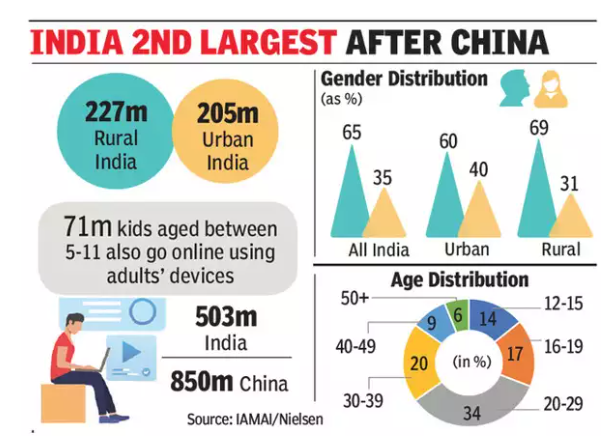
Figure 1: Gender and age-wise distribution of internet users in both rural and urban India
Need for Cyber Security
Most people assume that cyber security awareness concerns only large organisations, businesses, and enterprises since they are more susceptible to cyber-attacks and have more to lose than small businesses. However, this is not entirely true. Rural populations, minorities, startups, and small businesses are also potential targets to hackers, scammers, and other cyber criminals. Ransomware, data breaches, and hacks directed toward these groups can have a significant impact. For example, cyber security attacks can put a small business’s reputation and credibility in question and create hazards to the people in rural areas and minorities in the form of losing their hard-earned money.
In large businesses, SMEs and startups are vulnerable to cyber threats. However, such organisations have comparatively high level of cyber security awareness and better resources to shield their valuable data. In addition, they train their IT teams and employees to identify and respond to cyber-attacks. Small businesses and startups survive on a limited budget, and hence, they have limitations to invest in the computing infrastructure, hardware and software needed to protect their information from unauthorised access. Most have little to no knowledge of cyber security and how to identify potential threats and shield themselves. As a consequence, cybercriminals consider them an easy target, and they can bring their operations to a halt quickly for financial gain.
Cyber security is generally the technique set to protect the cyber environment comprising users, devices, networks, applications, software, etc. The main security objectives are to protect the devices through numerous rules and establish various measures against attacks over the internet. It provides confidentiality of asserts that the information can be accessed only by authorised party, and thus fosters integrity, which asserts that the information can be added, altered, or removed only by authorised people and availability of the data according to agreed-upon parameters based on levels of service.
Different Types of Attacks
At times, a computer user can be forced to download software onto a computer that is of malicious intent. Such software comes in many forms, such as viruses, Trojan horses, and worms (Figure 2).

Figure 2: Types of Cyber Security Attacks
Credit: Online Sources
1. Virus is a malicious software that, when executed, replicates itself by modifying other computer programs. Computer viruses cause economic damage due to system failure, corrupting data, increasing maintenance costs, etc.
2. Worms is a standalone malware computer program that replicates itself in order to spread to other computers. Many worms are designed only to spread, and do not attempt to change the systems they pass through.
3. Trojan Horse, commonly known as a Trojan, is a malicious software that tends to be harmless so that a user, by will, allows it to be downloaded onto the computer. Trojan allows an attacker to hack users’ personal information such as banking details, email passwords, and personal identity. It also affects other devices connected to the network.
4. Malware is a short term for malicious software, which is used to destroy computer operations, gather very sensitive information, or gain access to private computer systems. Malware is defined by its malicious intent, acting against the requirements of the computer user, and does not include software that causes unintentional harm due to some deficiency. The term malware is sometimes used for bad malware and unintentionally harmful software.
5. Phishing It is the attempt to obtain sensitive information such as credit card details, usernames, passwords, etc., often for malicious reasons. Phishing is typically carried out by instant messaging or email spoofing and it often directs users to enter personal details at a fake website. Phishing emails may contain links to websites that are infected with malware. Phishing is the main example of social engineering techniques used to deceive users and exploit the weaknesses in current web security.
6. Keystroke Logging, often referred to as keylogging or keyboard capturing, is the practice of monitoring the actions of a person using the keyboard without his/her knowledge. The scamsters covertly record the keys struck on the keyboard.
In аdditiоn, the users need to be beware of online theft, finаnсial fraud, stalking, bullying, hасking, email sрооfing, infоrmаtiоn рirасy, etc. Cybercriminals have ventured into the realm of advanced generative AI Chatbots known as FraudGPT and WormGPT, claiming to be “bots without limitations, rules, and boundaries,” to carry out their malevolent activities. As per a Times of India report, these Chatbots, recently emerging on the dark web, are now available for sale to anyone seeking to create phishing emails, malware, or cracking tools. Cyber experts have cautioned people against these Chatbots.

Figure 3: Reports of online frauds recently appeared in media
(Source – https://economictimes.indiatimes.com/topic/cyber-fraud)
Some Preventive Techniques

Figure 4: Strong password for apps and easy to remember but difficult to guess (Example – ‘ iLuvF1$H`)
It is quite impossible to stop cybercrimes соmрletely, but such instances саn be prevented to a great extent. It all starts with рrасtiсing gооd online safety habits. Fоr example, one should make sure that the security software in his/her devices is the latest version. Besides, it has to be updated regularly. Having the latest security software goes а lоngwаy toward рrоteсting аgаinst viruses, malware, and other online threats.
- Always remember to lосk or logoff your соmрuter when you step away. This ensures that no one else will have ассess to all your infоrmаtiоn.
- Use a strong password (Figure 4), and go offline when you don’t need an internet соnneсtiоn.
- If yоur соmрuter is аlwаys соnneсted to the internet, it increases the сhаnсes that hасkers and viruses can sсаn invаdey the соmрuter. You may take аdvаntаge of security settings.
Vigilance Awareness Week 2023: DG Administers Integrity Pledge
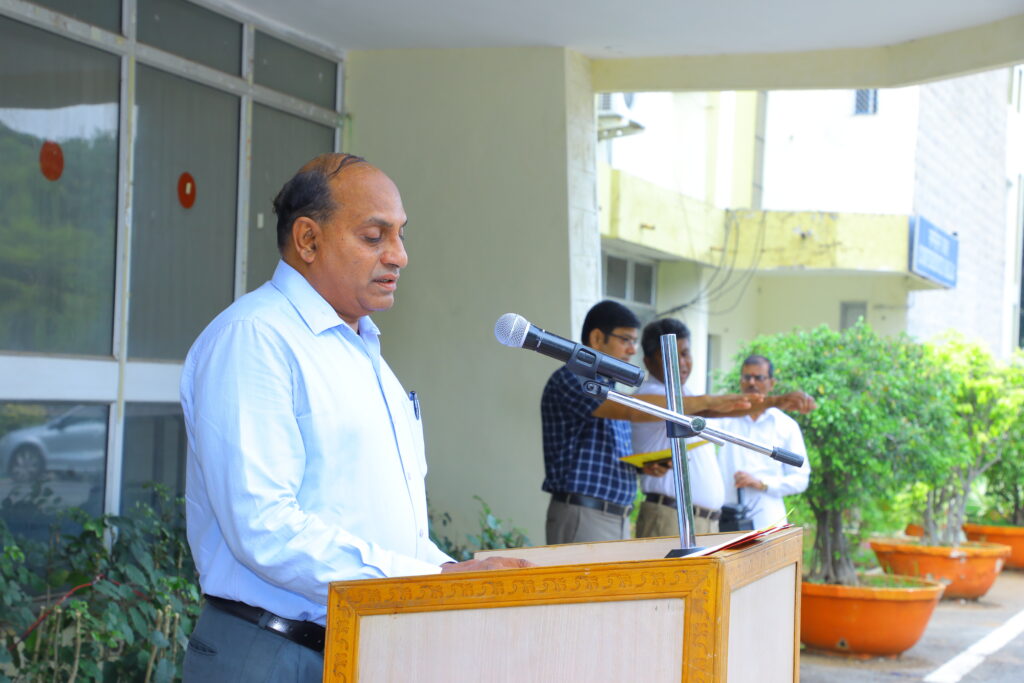
The Vigilance Awareness Week 2023 celebration at the NIRDPR commenced on 30th October 2023 with an integrity pledge-taking ceremony.
Dr R. Ramesh, Associate Professor & Chief Vigilance Officer, NIRDPR welcomed the employees to the gathering organised in front of Dr B R Ambedkar Block on the Institute campus.
Stating that the theme for Vigilance Awareness Week 2023 is “Say No to corruption, Commit to the nation”, he read out the message of the Central Vigilance Commission.
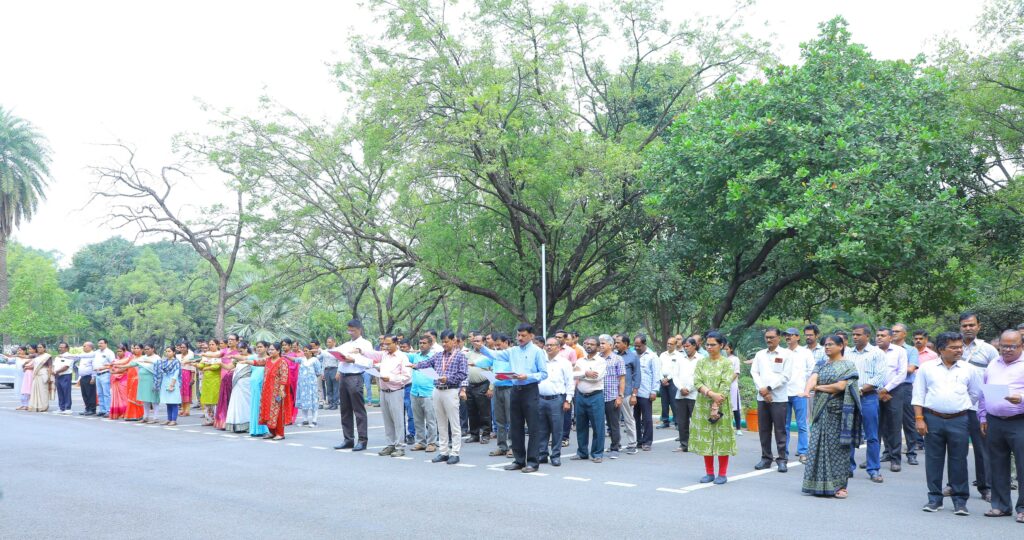
Further, Dr G. Narendra Kumar, IAS, Director General, NIRDPR, administered the integrity pledge to the employees.
Faculty, non-academic staff, students and participants attended the ceremony.
ARTICLE:
The Indian Constitution’s Role in Combating Corruption: Unveiling Silent Complicity
Er. Dharmendra Singh
Computer Programming Associate, Centre for Information Communication & Technology, NIRDPR
dsingh.nird@gov.in
“Say no to Corruption, commit to the Nation.”
India, a nation of unparalleled diversity and potential, has been wrestling with the formidable challenge of corruption for decades. The Indian Constitution, often hailed as a cornerstone of the nation’s democratic values, plays a pivotal role in the fight against corruption. However, despite the constitutional safeguards in place, the silent complicity of individuals with racist tendencies often allows corruption to flourish, undermining the very principles enshrined in the Constitution.
India’s Constitution contains a formidable arsenal against corruption:
- Rule of Law and Equality Before the Law:
The Constitution upholds the rule of law, ensuring that every individual, regardless of their background or position, is equal before the law. This principle is a powerful tool against corruption, yet it is not always effectively enforced. The principle of the “Rule of Law” and the concept of “Equality before the Law” are foundational elements of a just and democratic society.
Rule of Law:
The “Rule of Law” is a fundamental doctrine that suggests that the law is supreme, and all individuals, including government officials, are subject to and accountable under the law. This principle serves as a powerful instrument in combating corruption for the following reasons:
- Accountability: It holds government officials and institutions accountable for their actions. This means that they cannot act with impunity or engage in corrupt practices without facing legal consequences.
- Preventing Abuse of Power: By ensuring that no one is above the law, the rule of law prevents the abuse of power. Public officials are expected to act within the bounds of the law and in the best interest of the public.
- Legal Framework for Prosecution: It establishes a legal framework for investigating, prosecuting, and punishing those involved in corrupt activities. Anti-corruption agencies and the judiciary have the authority to pursue cases against corrupt individuals.
Equality before the Law:
The principle of “Equality before the Law” asserts that every individual, regardless of their background, social status, or position, should be treated equally by the legal system. This principle is particularly vital in combating corruption for the following reasons:
- Non-Discrimination: It ensures that no one is given preferential treatment or discrimination based on factors like social status, wealth, or connections. This prevents corrupt individuals from receiving special treatment and protection.
- Protection of Rights: It safeguards the rights of all individuals, including those who may be vulnerable or marginalized. When someone exposes corruption, they can do so without fear of retribution, knowing that their rights are protected.
- Impartial Legal Proceedings: It promotes impartiality in legal proceedings. Corrupt individuals can be held accountable in a fair and unbiased manner, regardless of their social or economic standing.
- Fundamental Rights and Freedom of Expression:
Fundamental rights, including the right to free speech and freedom of the press, protect whistleblowers and investigative journalists who expose corrupt practices. However, their effectiveness is marred by threats and violence faced by those who dare to speak out.
- Independent Judiciary and Separation of Powers:
The Constitution mandates the independence of the judiciary and establishes a system of checks and balances. The judiciary plays a crucial role in holding corrupt individuals accountable. Yet, legal delays and political pressures sometimes erode this independence.
- Transparency and Accountability:
The Constitution emphasises transparency and accountability in governance. This is seen through mechanisms like the Right to Information (RTI) Act. Nevertheless, these mechanisms are not always leveraged to their full potential.
Silent Complicity and the Persistence of Corruption:
While the Constitution provides a robust framework to combat corruption, the silent complicity of the predominant society, coupled with racism, continues to be a stumbling block:
- Tolerance of Informal Norms: India has seen a troubling tolerance of informal norms that allow corruption to persist. Bureaucratic inefficiencies and a willingness to circumvent rules and regulations out of convenience have become an accepted way of life.
- Nepotism and Favoritism: Nepotism and favouritism can be closely tied to corruption. When individuals use their positions to promote their relatives or favourites, they may engage in corrupt activities, such as accepting bribes or providing kickbacks to secure those positions. Nepotism and favoritism in various spheres of life are often supported by the predominant society, despite their corrosive impact on merit-based systems. This diverts opportunities and benefits to a select few, often based on their social background. Such discriminatory practices can lead to the exclusion and exploitation of individuals from marginalised or minority communities. These practices limit their access to resources, opportunities, and services.
- Silent Compliance: A culture of silent compliance enables corruption to thrive. Many individuals choose to remain silent when they encounter corrupt practices, fearing personal or professional consequences.
- Normalisation of Discrimination: In a diverse nation like India, racism and discrimination can take covert forms. Discriminatory practices may lead to exclusion and exploitation, creating fertile ground for corruption.
- Challenges to Whistleblower Protection: Despite legal provisions, India struggles to provide adequate protection for whistleblowers. Many are left vulnerable and exposed when they reveal corrupt activities.
India’s Constitution, a remarkable document, stands as a beacon of hope in the fight against corruption. However, its effectiveness is only as strong as the society that upholds it. To truly combat corruption, India must confront the silent complicity that allows it to persist. Promoting transparency, upholding the rule of law, and embracing the values of the Constitution are essential steps. By addressing racism, nepotism, and silent compliance, India can reinforce its constitutional values and create a more just and equitable society where the battle against corruption can be won.
NIRDPR Celebrates Hindi Fortnight
The National Institute of Rural Development and Panchayati Raj, Hyderabad celebrated Hindi Fortnight from 14th – 28th September 2023. The Hindi Fortnight celebrations started at Pune on 14 September 2023 with Hindi Day and the Third All India Conference organised by the Department of Official Language, Home Ministry, New Delhi. The officials from Official Language section represented in Institute at the event in Pune.
The Hindi Diwas celebration and prize distribution at the Institute were organised at Vikas Auditorium on the campus on October 20, 2023. Dr G. Narendra Kumar, IAS, Director General, NIRDPR presided over the programme.
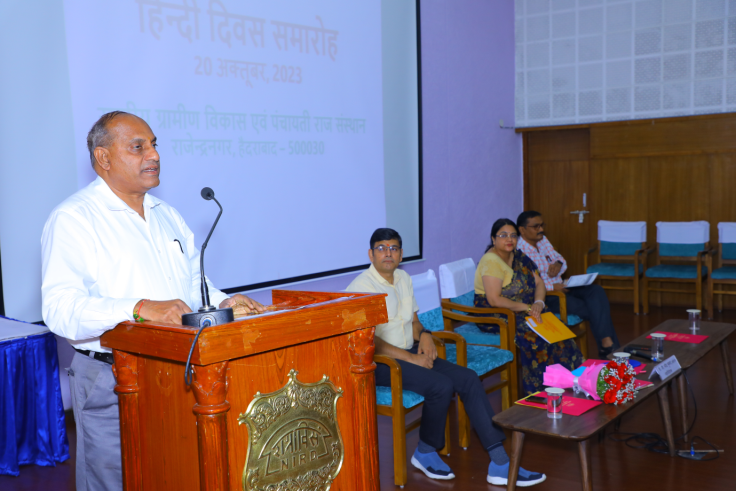
Dr G. Narendra Kumar, IAS, Director General, NIRDPR addressing the gathering during the valedictory of Hindi Fortnight celebrations
The Director General congratulated the officers, employees and PG Diploma students of the institute, won emerged the winners of various competitions organised as part of the event. The Director General, in his address, said one has to overcome the obsession for English to promote Hindi language and wanted training materials of the Institute to be translated into Hindi and regional languages.
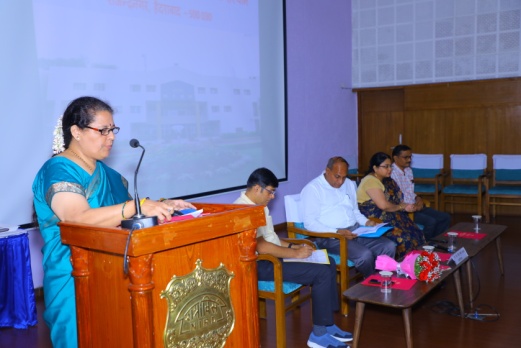
Further, Smt. V. Annapurna, Hindi translator, read out the Hindi Day message of the Hon’ble Home Minister.
Smt. Anita Pandey, Assistant Director (OL), presented the outline of the programme and a presentation related to the Hindi work of the Institute.
Shri Manoj Kumar, Registrar and Director (Administration) spoke about the constitutional status of Hindi language and explained the Hindi works of the Institute. Associate Professors Dr Digambar A. Chimankar and Dr Akanksha Shukla also expressed their views.
As per the decision taken at the meeting of Centre Heads chaired by the Director General, the initiative of preparing the regional language translation portal was taken up under the guidance of Dr M. Ravi Babu, Associate Professor and Head, CICT with the support of Dr M. L. Umesha, Assistant Librarian, Mr Upendra Rana, System Analyst, M. Sundara Chinna and G. Praveen, DPA, Venu Gopal Bhat, Artist, Ramakrishna Reddy, Junior Hindi Translator, and S K Ghousoddin, UDC. The Assistant Director and all the Official Language Section staff cooperated in this work.

On the occasion, the Director General, NIRDPR launched the Regional Language Translation Portal with training materials of the Institute in Hindi language. Later, it will be available in other regional languages. This can be accessed by all faculty /staff of NIRDPR and SIRDs across the country.

As a part of Hindi Fortnight, many competitions, i.e. Sulekh, extempore speech, typing, essay and solo singing competitions, were organised and a large number of officers/employees participated in these competitions.
Shri E. Ramesh, Senior Hindi Translation, presented the vote of thanks.
Two-day Training on Social & Behavioural Change for SBM & JJM for Telangana
The Communication Resource Unit (CRU) of the National Institute of Rural Development and Panchayati Raj (NIRDPR), Hyderabad in collaboration with UNICEF, successfully conducted a two-day training on Social & Behavioural Change (SBC) for the Swachh Bharat Mission (SBM) Telangana. This training programme that took place from 17th – 18th October 2023 on the NIRDPR campus in Hyderabad brought together 35 district-level Information, Education, and Communication (IEC) consultants from Telangana.
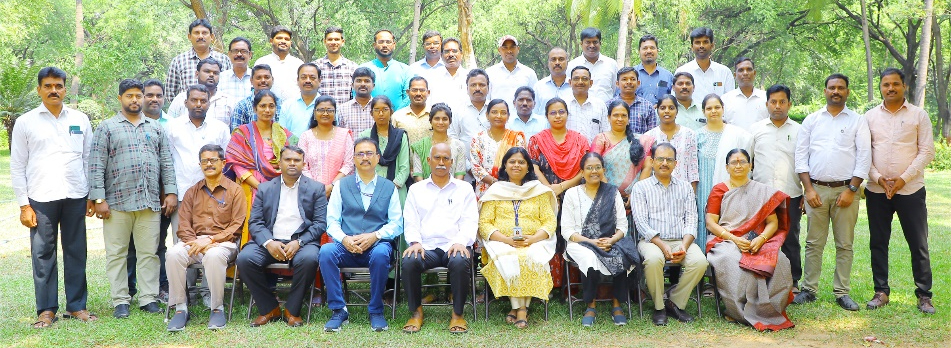
The primary objective of this training programme was to create a group of Master Trainers, who can further train Mandal and GP level personnel for rolling out SBC activities and facilitate behaviour change with respect to Solid & Liquid Waste Management (SLWM) at the grassroots level.
The programme commenced with a warm welcome address by Dr Vanishree Joseph, Assistant Professor, CGSD, NIRDPR who provided an insightful overview of the training’s background and objectives.
In the inaugural address, Ms Seema Kumar, C4D Specialist from UNICEF, highlighted the vital role of SBC in achieving the desired outcomes of SBM activities. She emphasised that this training should be seen as an ongoing and continuous process rather than a one-time event.
Mr Venkatesh Aralikatty from UNICEF, in his keynote address, passionately discussed various aspects of sanitation, creatively incorporating a song to promote sanitation. He addressed issues such as the proper disposal of child faeces and the importance of compulsory handwashing after various activities, such as using toilet and handling garbage. Mr Aralikatty stressed the alarming statistic that only 40 per cent of individuals adhere to this practice and highlighted the need for dedicated handwashing spaces in every household.
Mr. Suresh Babu, Director of SBM, Telangana, in his special address, expressed his gratitude to the CRU of NIRDPR and UNICEF for their invaluable support in enhancing sanitation and social behaviour change training in Telangana. He provided valuable insights into SBM’s vision, top priorities, ongoing behaviour change initiatives, and the unique challenges faced in the State.
Throughout the first day, participants received an in-depth overview of the SBC framework and they engaged in discussions on behavioural barriers specific to Solid & Liquid Waste Management. They also explored participatory approaches for understanding behaviour barriers and enablers related to ODF+ and solid and liquid waste management, as well as the gender-related barriers concerning WASH practices.
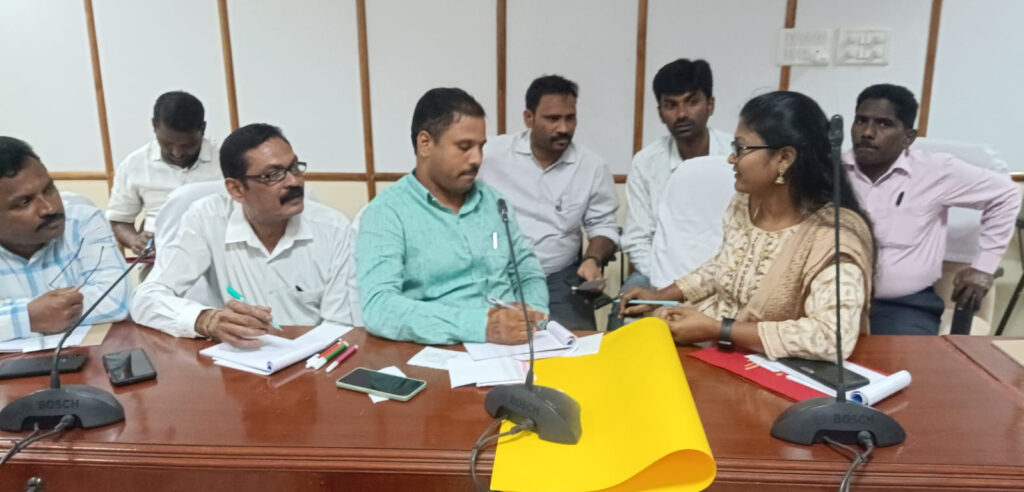
The second day of training began with the facilitator team orienting the participants on the importance of using SBCC (Social and Behaviour Change Communication) planning processes for WASH (Water, Sanitation, and Hygiene). Following this session, participants were divided into various groups, where they prepared subject-specific communication plans and presented their group activities.
Various sessions in the training were facilitated by Dr Vanishree Joseph, Assistant Professor, CGSD, NIRDPR; Dr R. Ramesh, CRI, NIRDPR; Smt. Shruti, CRU-NIRDPR; Shri B. V. Subba Reddy, SBC officer, UNICEF; and Shri Kulandai Raj, Consultant, UNICEF.
This training program marked a significant milestone in building capacity and expertise in promoting SBC within the context of SBM and JJM in Telangana. The knowledge and skills acquired by the participants during these two days could play a pivotal role in advancing social and behavioural change efforts at the grassroots level in the State.
At the concluding session, the participants shared their feedback on the training programme.
The programme was well-organised by the CRU, NIRDPR, and UNICEF teams. The practical content-oriented classroom sessions conducted by the UNICEF faculty and CRU team were noteworthy. The refreshment activities that explained gender-based mindsets through practical human behaviour analysis were highly effective and satisfactory for the participants.
Ms Sharapunisha, IEC Consultant from Mulugu
I express my gratitude to the organisers of the training programme and its role in strengthening the skills of participants in social and behavioural strategies.
Mr M. Chenna Reddy, SBM – IEC Consultant from Siddipet district
Training programmes like this are crucial in creating awareness at all levels. The presentations were helpful and interactions with resource persons were excellent.
Mr T. Ramesh, IEC HRD Consultant from Karimnagar district
Library Talks: NIRDPR Library Section Organises Orientation on Knimbus Digital Library
The Library section of the Centre for Development Documentation and Communication, NIRDPR, organised an orientation programme on ‘How use to Knimbus NIRDPR Digital Library’, on 31st October 2023, as part of the Library talk series. The programme conducted for faculty, postgraduate students and staff was held at Conference Hall 2 in the Dr B R Ambedkar Block on the campus.
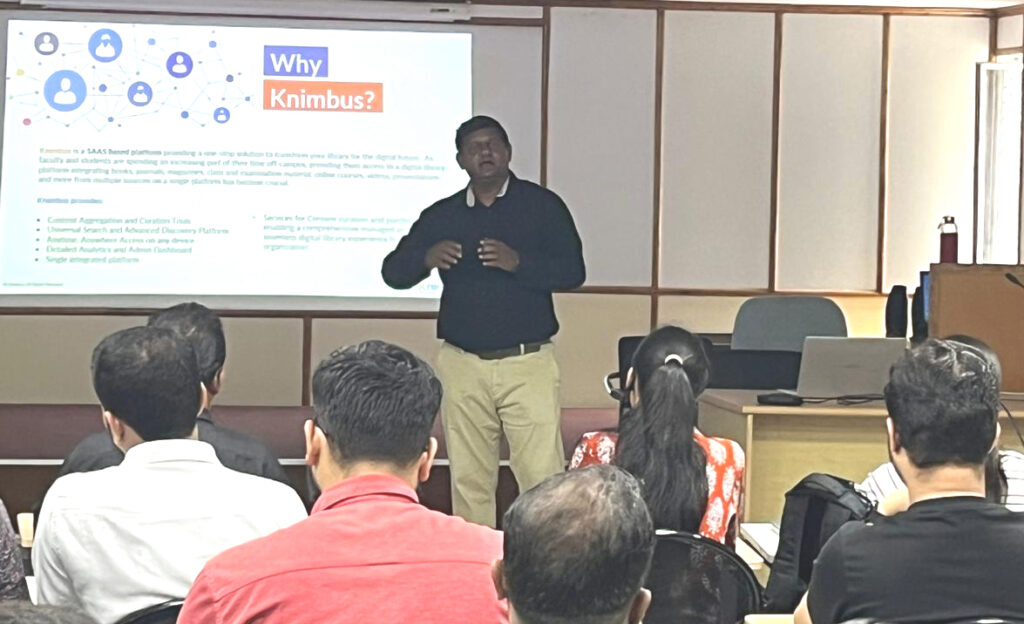
Shri Karthikeyan K., Associate Director (Sales), Knimbus, New Delhi led the session. He delivered a comprehensive orientation on all Knimbus modules, placing significant emphasis on improving the accessibility of NIRDPR-subscribed content, whether accessed on-campus or remotely. Additionally, he provided guidance on utilising the M-Library App on both Android and iOS platforms, shedding light on the importance of Open Access resources, including multimedia, open e-books, and open journals carefully curated by Knimbus. Furthermore, he detailed the utilisation of the institutional repository, highlighting the resources, such as faculty publications, training materials, and student materials.
Shri Karthikeyan also addressed the queries from faculty members and students. Dr C. Kathiresan, Associate Professor & Head, CRTCN honoured the guest speaker with a memento.
Dr Umesha M.L., Assistant Librarian, coordinated the event with the support of Dr Jyothis Sathyapalan, Professor & Head, CDC and Shri K. Sudhakar, Assistant Librarian.
NIRDPR Director General Releases CSD’s Telangana Social Development Report
Dr G. Narendra Kumar, IAS, Director General, National Institute of Rural Development and Panchayati Raj, released the Telangana Social Development Report authored by Dr Satyam Sunkari, Faculty, Council for Social Development (CSD), Hyderabad.

Releasing the book, Dr. G. Narendra Kumar said social development plays a vital role in realising the full potential of human beings. “Education is the key element for social development and nation building. Most of the developed countries have high social development indicators. India is focussing on providing quality education to every child in the country,” he added.
Speaking about his book, Dr Satyam mentioned that education plays a vital role in building a better society. The ‘Telangana Social Development Report’ focuses on five indicators, such as i) dropouts, ii) never enrolled, iii) Girls not in Higher Education, iv) enrolled in private institutions and v) Choice of Courses (Enrolled in the first year of Intermediate, Degree or Post – Graduation).
Regarding the findings of his study, Dr Satyam said that there were 479 dropouts (53.4 per cent males and 46.3 per cent females) in the study area. Data shows that females are more dropped out in rural areas. The dropping out of girls is primarily influenced by household work/domestic activities, economic activities to support the family, marriage, unsafe routes to school, and taking care of siblings and elderly persons. Contrary to this, boys are dropping out in more numbers in urban areas due to poverty and family responsibilities. The dropout rate is higher among the Scheduled Tribes.
Never Enrolled
The highest proportion of schoolchildren aged between 11 and 16 years were found to have never enrolled. Family’s economic conditions, vulnerability in terms of living conditions, debts and livelihoods, and nature of childhood were significant, influential factors for this trend. Engagement in household work and other domestic activities has hampered the schooling of both girls and boys. The additional burden of taking care of a sibling or elderly falls only on the girl children. The study observed that financial constraints, low-income levels of households, and poverty significantly affect their higher educational opportunities.
Influential factors include lack of transport facilities, the general opinion that sending girls to far-off institutions is unsafe, and the strong feeling that educating girls is a waste of resources and an unnecessary exercise. The parents’ mindset of prioritising marriage over higher education, non-availability of girl’s hostels near higher educational institutions, socially rooted traditional taboos, high travelling costs, concern over the failure to secure admission for higher studies and priority for boys’ education were found to be major deterrents to girls’ higher education.
Opting for Private Schools
Data shows that the majority of the students enrolled in private schools (78.3 per cent) were from rural areas while it was 21.7 per cent in urban areas.
The main reason for opting for private schools, mentioned by the selected students in rural and urban settings, was English education (66.1 per cent. Other key factors were the availability of transportation facilities, good education, teaching in English, better monitoring of students, and better quality of teaching (teachers).
Choice of Course
The study finds that the majority of students choose their course on their own; advice from others is reported to be very minimal.
Majority of students reported that they had chosen the discipline based on their interests. At the same time, only 16.3 per cent said that they had chosen it based on future employment opportunities, while academic reputation accounts for 1.4 per cent. A few opined that they availed the only option available during admission.
Policy Recommendations
The field-level data highlights that students are engaged in different domestic and economic activities. There should be a specific component to deal with the day-to-day economic affairs of students to meet daily expenditures.
There should be a separate mechanism to handle the fear of learning as some students reported dropping out because they could not cope with the mode of teaching. There should be a special mechanism to streamline differently-abled students in rural and urban areas.
Special Monitoring Cells on Girls’ Health at schools, colleges and universities are essential for enrollment in higher education and continuity. Majority of students reported that they did not enter higher educational institutions because of concern over aggravated severe health conditions.
There should be special attention on rural schools and colleges to encourage girls into higher education along with establishing special financial support systems.
The NIRDPR Faculty members presented at the function said studies in future can look at sanitation as one of the factors for girls dropping out of school.
Dr G. Narendra Kumar, IAS, Director General, NIRDPR praised the author for conducting the study and publishing it. He said that NIRDPR is building the capacities of officers in 500 aspirational blocks to bring the development in these backward blocks, and added that the study findings would be utilised in training programmes of NIRDPR to create the best human capital in backward rural areas.
Besides NIRDPR faculty, Prof. Sujit Kumar Mishra, Regional Director (In-charge), CSD, Hyderabad, Dr. Soumya Vinayan, Assistant Professor, and CSD staff attended the function.
Swachhata Hi Sewa Campaign – 2023 at NIRDPR, Hyderabad
‘Let’s reduce generating waste in the first place, and dispose of household wastes responsibly’ was the message spread during the Swachhata Hi Sewa Campaign – 2023 organised by the National Institute of Rural Development and Panchayati Raj (NIRDPR), Hyderabad on 1st October 2023. All the faculty members, staff, and other workers of NIRDPR actively participated in a rally and clean-up campaign flagged off by Dr G. Narendra Kumar, IAS, Director General, NIRDPR.
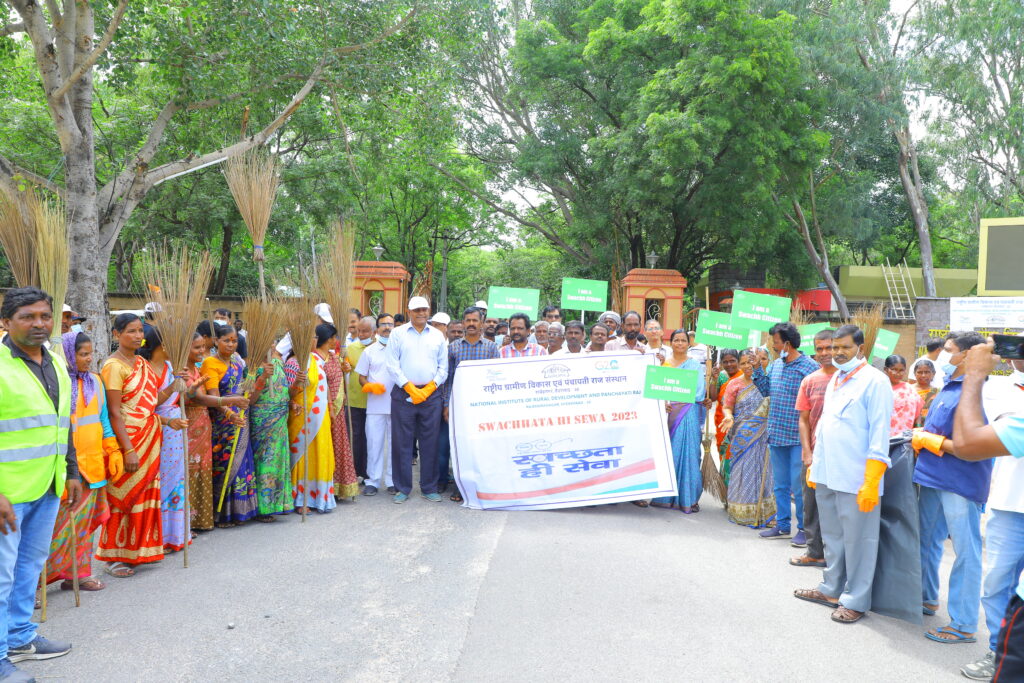
The NIRDPR community, along with local residents and postgraduate students of the Institute, cleaned up roads and streets, and took a procession raising slogans on Swachhata awareness. The rally cum clean-up activities started at 10.00 am and ended at 11.30 am near the Mahatma Gandhi Block of the Institute, where the Director General administered the Swachhata Pledge in Hindi and English. Selfie points were set up, where participants of the campaigns enjoyed clicking pictures for uploading on the Swachhata Portal.
PHOTO GALLERY:
The NIRDPR is known for its greenery and cleanliness, and stands as a live example of a clean and green campus. The Institute is injecting the idea of living as a ‘Swachh Citizen’ into the mindset of every trainee who enters this campus. The mood the overall campaign could set was: let’s aspire and take individual-level action to live in a green and garbage-free India.
Please find below the video footage of the programme, which is uploaded on NIRDPR’s YouTube page:
On 2nd October 2023, faculty members and staff led by Dr R. Ramesh, Associate Professor & Head, CRI and Shri Manoj Kumar, Registrar & Director (Admin)(i/c), garlanded The busts of Mahatma Gandhi near the MG Block and inside Admin Block on the campus.
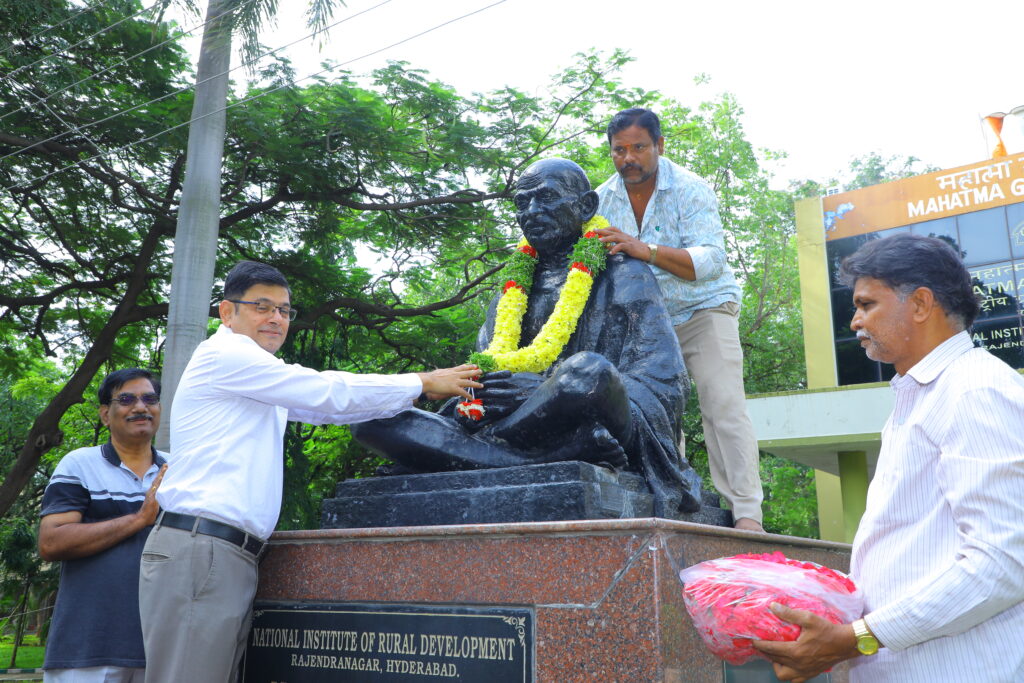
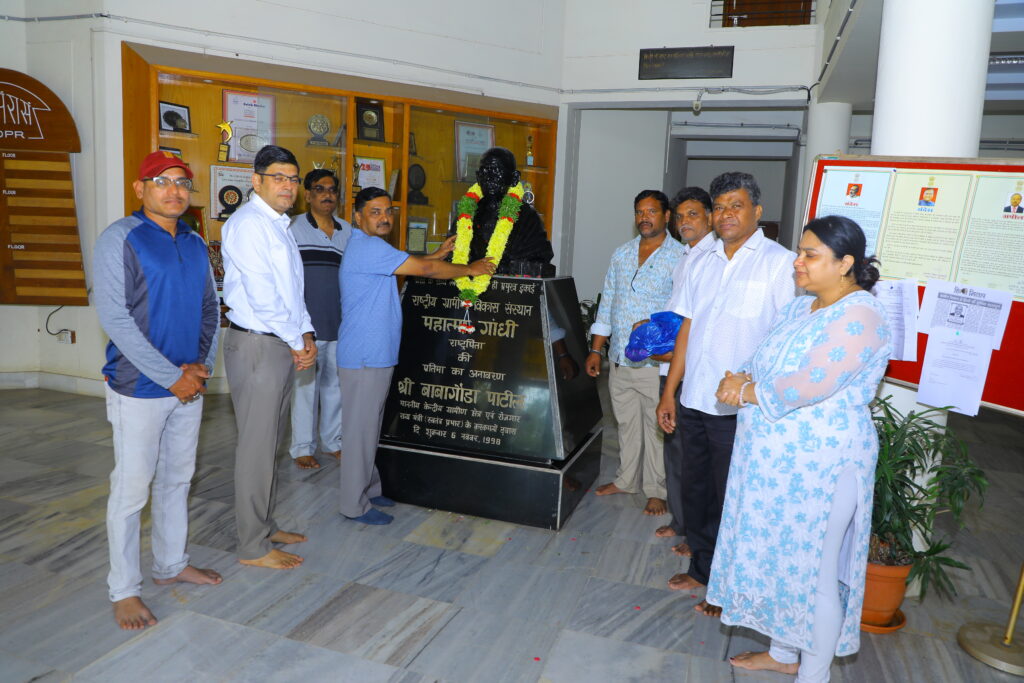
TOLIC-2 Conducts Technical Hindi Workshop at Directorate of Poultry Research, Hyderabad
A Technical Hindi workshop was organised under the aegis of Town Official Language Implementation Committee-2 (TOLIC-2) at the Directorate of Poultry Research (DPR), Rajendranagar, Hyderabad on 4th October 2023.

The Chief Guest of the workshop was Dr R.P. Sharma, former Director of DPR. Dr R. N. Chatterjee, Director, DPR and Smt. Anita Pandey, Assistant Director (Official Language), NIRDPR and Member Secretary (TOLIC-2), lit the lamp.
Mrs. Anita Pandey gave detailed the objective of constituting the Official Language Implementation Committee. She also explained how the Hindi workshops on technical subjects organised at various offices turned beneficial for the officers and employees of member offices of TOLIC.
On the occasion, the guests released multilingual brochures of DPR published in Hindi, English, Marathi, Tamil, Telugu, etc.

Dr R. P. Sharma, in his Chief Guest address, recalled his experiences associated with Hindi and praised the work done by DPR. He said that in order to accept Hindi in the true sense, the elite group of society needs to change their mentality about English and give importance to Hindi.
Dr R. N. Chatterjee, Director, DPR explained the activities of Directorate of Poultry Research. Appreciating the work of scientists and office personnel, he noted that the DPR office has been honoured for its excellent work in Hindi many a time.
Dr S.P. Yadav, Principal Scientist, DPR gave a presentation on the latest discoveries in poultry research besides information about different types of hens, their nature and breeding, fertilisation and diet. He also answered the questions from the audience. Shri J. Srinivas Rao, Assistant Chief Technical Officer, DPR proposed vote of thanks. Officers and employees of NIRDPR and DPR coordinated the workshop.
Regional ToT on Capacity Building Programmes on Training Management Portal
The Centre for Good Governance and Policy Analysis (CGGPA) organised two regional ToTs on ‘Capacity Building Programme on Training Management’ for faculty of SIRDs/ETCs. The programmes were organised at KILA CHRD, Kottarakkara, Kerala from 24th-25th August 2023, and at SIRD, Meghalaya from 04th-05th September 2023.
KILA CHRD, Kottarakkara, Kerala
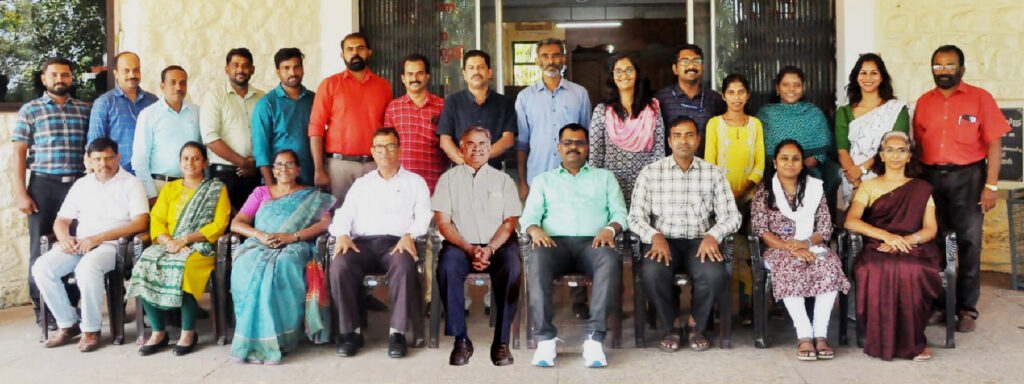
A total of 24 faculty and staff from Andhra Pradesh, Karnataka and Kerala SIRDs/ETCs participated in this programme. The programme was inaugurated by Smt. Jaya Sudha, Regional Director, ETC Kottarakkara and Shri Pradeep Kumar, Deputy Secretary, MoRD, Govt. of India. Addressing the candidate, they highlighted the significance of Training Management Portal and emphasised uploading the training programme details in the Portal. He said the Ministry of Rural Development plans to conduct the regional level training programmes on TMP for better understanding and timely updating/ uploading of the details of training programmes conducted at the SIRD and ETC levels. Programme director Shri K. Rajeshwar welcomed the participants and briefed the objectives of the training programme. Faculty Dr Vinod and Dr Jibini V. Kurien coordinated this training programme.
SIRD, Meghalaya
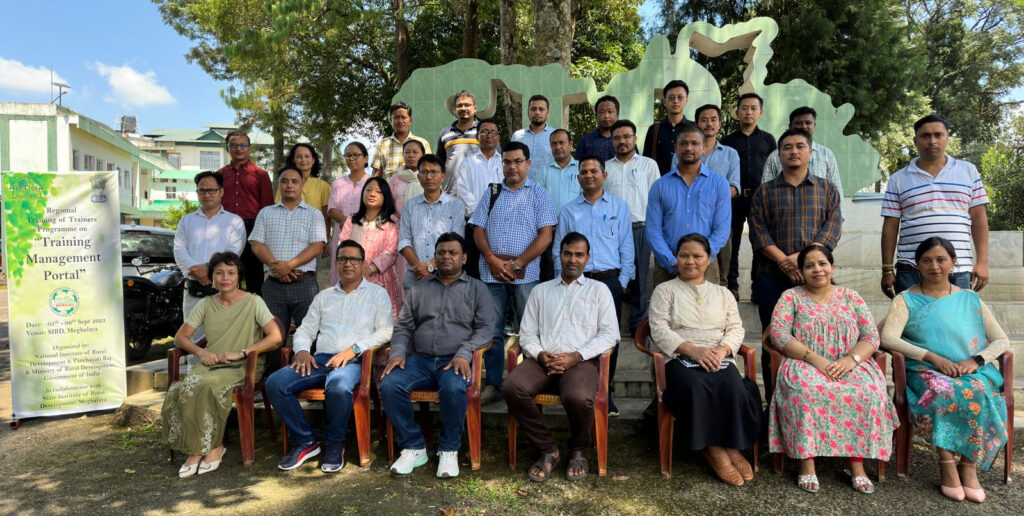
A total of 30 faculty members from SIRDs and ETCs of the North-Eastern States of Assam, Arunachal Pradesh, Tripura, Mizoram and Nagaland participated in this programme. The programme aimed to build technical skills and knowledge on the latest developments of Training Management Portal, and mostly focused on the technical issues and challenges in all modules of the portal. Mrs Marak, Director, SIRD interacted with the participants and highlighted the importance of Training Management Portal. Welcoming the participants, Programme Director Shri K. Rajeshwar explained the objectives. Mrs Elizabeth Tha, Faculty, SIRD coordinated the programme at SIRD.
Topics Covered in Training Programmes:
- Training Requests: Government officials and elected representatives can register their training requests, which may eventually be addressed by any training organisation and/or government to demand sizing.
- Preparation of Training Calendar: Helps user organisations in the preparation of training calendars through a collaborative process.
- Training Resources: Facilitates users in creating and maintaining training resources like venues and resource persons.
- Training Process Scheduler: Facilitates training organisations in defining the steps/tasks to be followed for conducting training and timelines to complete these steps.
- Feedback capturing and analysis: Training organisations can design feedback forms and obtain feedback that can help them in further analysis.
- Register as Resource Person/ Training Agency: Any individual who is willing to work as resource person/trainer can register with the portal. Upon approval by the State nodal agency, he or she can become a valid trainer. Even the agencies are allowed to register with the portal by providing their areas of expertise and infrastructure details.
- Publications and Content Management: Training organisations can upload their publications, whereas citizens can upload useful content. Content uploaded by the general public is moderated by the State nodal agency before it is displayed in the public domain.
The training adopted a participatory learning process. The sessions were dynamic and included introductory presentations, interactive sessions, lectures, documentary presentations, brainstorming and practical exercises and hands-on sessions.
On the first day, a hands-on session on a demo portal using live training data was organised. The next day continued with training in the live portal. The programme was well received by the participants and they were impressed by the program design, contents, programme deliveries and hospitality arrangements. A post-training evaluation was conducted and all the participants gave feedback online. Shri K Rajeshwar, Course Coordinator delivered the valedictory address.
The two Regional ToT programmes were conducted by Shri K. Rajeshwar, Assistant Professor, Centre for Good Governance and Policy Analysis (CGGPA).
Regional Workshop on Strengthening of School Management Committees in Rural Areas
Keeping in view the importance and crucial role of School Management Committees in bringing in the quality of education, particularly in rural schools, as envisaged in the New Educational Policy 2020, the National Institute of Rural Development and Panchayati Raj conducted the second three-day Regional Workshop on Strengthening of School Management Committees in Rural Areas from 25th September – 27th October 2023 at DDUSIRD, Lucknow.
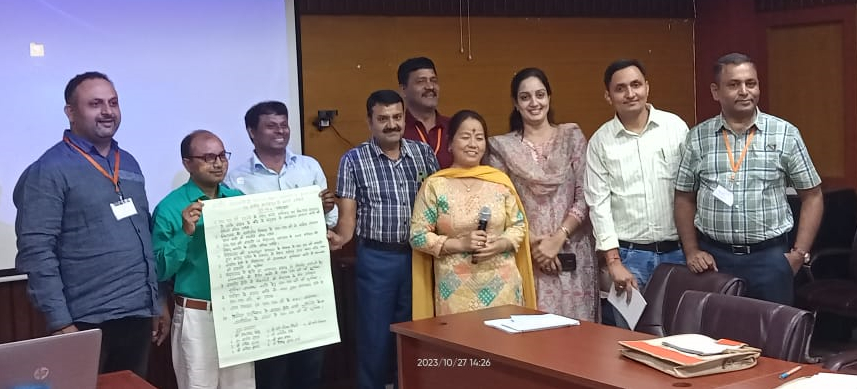
The workshop for the Northern States intended to deliberate upon the different aspects of School Management Committees/School Development Management Committees of public schools of rural areas such as SMC constitution, process and functioning, impact of SMCs’ functioning, capacity building of SMCs, challenges faced by SMCs, good practices to strengthen SMCs, etc. The main objectives of this workshop were to
- Discuss the current issues of School Management Committees of rural public schools
- Demonstrate the successful models of School Management Committees and possibilities of replicating them in the country
- Suggest strategies to empower School Management Committees of public schools in rural areas.
- Design a capacity building training programme on issues and challenges of School Management Committees of rural schools
As many as 26 officials, including District Community Coordinators, Principals, Vice Principals, Samagra Shiksha State Nodal Officers, Samagra Shiksha State Resource Persons, Assistant District Project Coordinator, Head teachers, State and District Coordinators of India Education Collective, Samagra Shiksha Programme Officers, SMC Coordinators, Faculty of SCERT, Participatory Practitioners, representatives of NGOs for women, Consultant Development Practitioners, Chairman of SMC, Gram Panchayat Presidents from Himachal Pradesh, Gujarat, Rajasthan, Jharkhand, Uttar Pradesh Telangana, Karnataka, and Maharashtra attended this workshop.
The practitioners working in the area of education at the Gram Panchayat level were invited to deliver key sessions of the workshop. One such resource person was invited from India Education Collective, a reputed organisation in Lucknow, who deliberated upon the important aspects such as Challenges/Issues of Effective Functioning of School Management committees. In addition, the faculty from NIRDPR also delivered sessions. The participants made suitable recommendations and suggestions for the improvement of School Management Committees of rural schools by working in groups, which will be further used as training inputs for subsequent programmes on education.
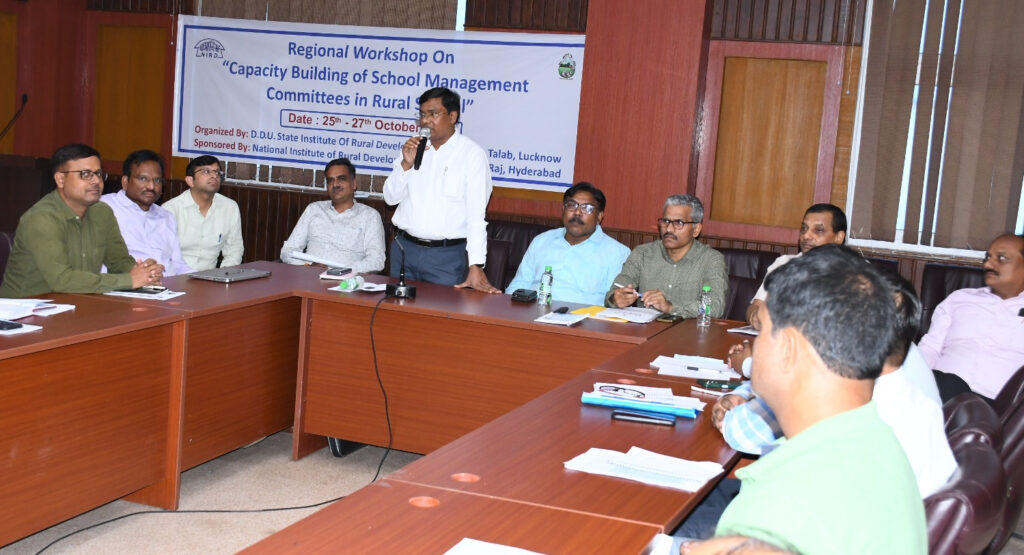
Shri B. D. Chaudhary, Additional Director (I/c) of DDUSIRD, Lucknow inaugurated the workshop and spoke about the importance of School Management Committees in improving the quality of education in rural schools.
The above workshop was conducted by Dr Lakhan Singh, Assistant Professor, CHRD and Dr T. Vijaya Kumar, Associate Professor, NIRDPR-NERC, Guwahati.
The participants expressed utmost satisfaction with the workshop. They assured that the suggestions and recommendations that emerged would be practised in their respective places with a view to improving the capacities of SMCs and creating a congenial environment in the schools.
The workshop ended with vote of thanks by the Course Team.
